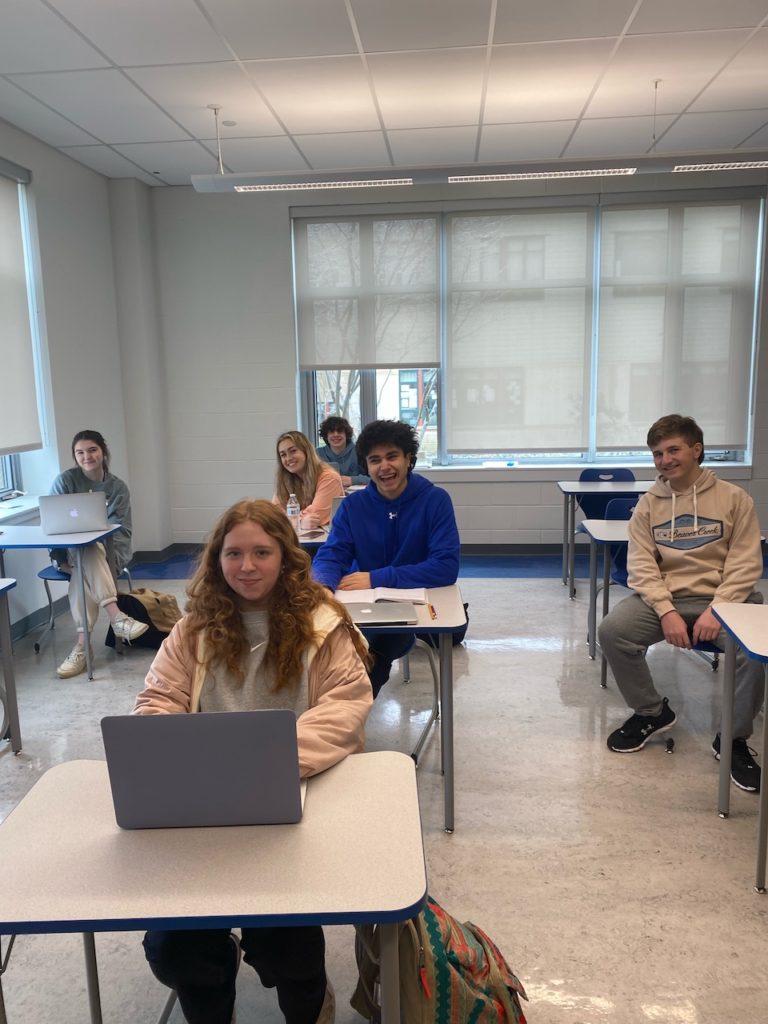Jack Riley ‘24 | Colin Schlitt ‘24
Sophomores must take a seminar course this year about the stripes and leadership. The course is run by seniors who are responsible for teaching sophomores about the stripes and improving their leadership skills.

Photo courtesy of Alyssa Sterner ‘24
Several of the senior teachers are a part of the Esse Quam Videri Society (EQV), which is a leadership program that strives to create unity and spirit within the Upper School. Outside of teaching Sophomore Seminar, EQV members also host other events and activities, such as the freshman orientation program.
The class goal is to mainly acclimate the sophomores to the Upper School environment, but also provide an opportunity for seniors to expand their leadership skills. Michael Whalen, US History teacher and the coordinator of the Sophomore Seminar, explains, “We hoped that by having the upperclassmen run it, it would give an opportunity to certain seniors to develop their own leadership skills and be a part of something that some of them maybe wouldn’t have had an opportunity to do before.”
Despite the course’s anticipated benefits, the seniors have found that teaching this class can be challenging. Ashley Tang ‘22, one of the senior teachers, explains, “I think that because it is the first year of seminar and no one has ever taught the course before, it’s hard to not have any references and know what to improve on.” In other words, the senior teachers have nothing to look back upon if confused on what to teach because the program is new to everyone.
Sophomores themselves have varying opinions about the course. Liam Blair ‘24 states, “10th grade seminar allows me to think about my values and the stripes in my own life.” Other students argue that the class is not worthwhile. Jason Daum ‘24 feels that the class is not useful because it “takes away a study hall, and we do activities that will not benefit me in the future.” Will Esterhai ‘24 agrees with Daum, saying,”On paper, the idea of running another seminar sounds like a beneficial idea for both the sophomores and the seniors, however I think that they didn’t anticipate that losing a study hall block was a big downside to the course.”
At the start of the second semester, students were assigned a “Legacy Project” by their seminar teachers. In this project, students must brainstorm solutions to potential flaws in the EA community and then act upon their proposal. Whalen says, “The legacy project is hopefully a chance for [the students] to implement those leadership skills. Ideally, they can leave an impact on the school.”
The classes came up with several different ideas that spanned across various topics. “My class is working on dress code reforms, but I know that another one is trying to make a life skills class to teach kids about filing taxes, laundry, and other important life skills to be independent,” says Tang. Other legacy projects include proposals to change course descriptions in order for students to get a better understanding of the courses when selecting them for the following year.
Although there are diverse views on if the seminar course is beneficial, Whalen thinks that the course is a great way to connect lowerclassmen to upperclassmen. “The seminar course is a good chance for sophomores to have an upperclassman that they can get to know and potentially connect with more than a teacher. It gives them something different,” believes Whalen.